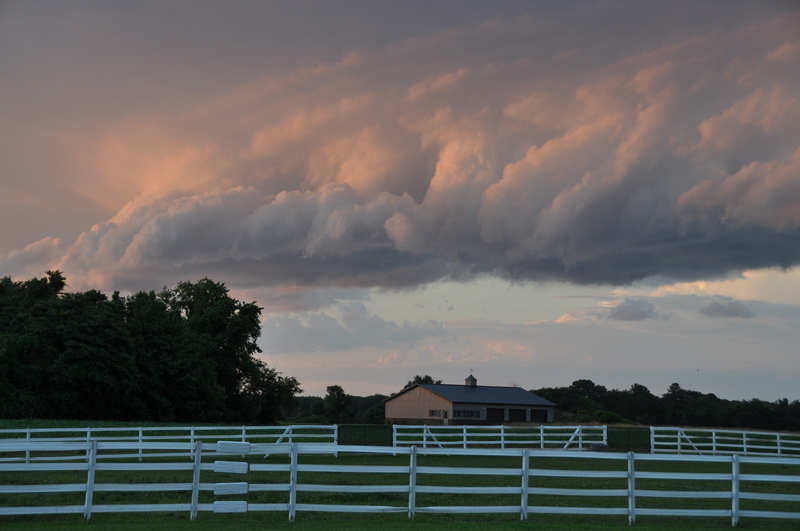On the tail end of two drought years, Delaware farmers could be expected to be ecstatic over the past month's rains. But farmers say too much of a good thing is still too much.
Patrick O'Hara, National Weather Service meteorologist in Mount Holly, N.J., said while rainfall in Georgetown has exceeded a three-year average, it did not set a record.
This year, Georgetown, the closest measuring station for NWS, had 13.78 inches of rain from June 1 to July 2. The average rainfall for the same time period over the past 30 years is 4.94 inches, he said.
In June 2011, Georgetown recorded 1.89 inches; 2010 had 2.69 inches. O'Hara said 2009 was wetter with just over 6 inches of rainfall for the same time period, still less than half of this year's tally.
“There is a huge contrast,” O'Hara said. “It's been quite a year.”
Austin Short, Delaware's deputy secretary of agriculture, said while the wet weather has saved farmers money on irrigation, it also causes problems.
“Farmers have been having a hard time harvesting small grains like wheat because the fields are too wet,” Short said. “Wet weather can start to affect the quality of the grain if it stays in a wet field too long.”
Farmers are struggling to get the wheat harvested and soybeans planted, Short said. Soybeans should be planted by mid-July to ensure a good growing time and harvest, he said.
“At this time last year, most places had half the rainfall we've had so far,” Short said. “We've gone from one extreme to the other.”
|
Prevent mosquitos on your property Dr. William Meredith, DNREC mosquito-control administrator, says residents can prevent mosquito infestations by taking these steps: • Practice good water sanitation by removing standing water, especially if it has been there for longer than four days. • Reduce areas where water can accumulate • Clean out rain gutters after a storm • Drain flower pot liners • House uncovered trash cans under a roof or empty after each rainfall • Drain kiddie swimming pools • Regularly change the water in bird baths or drain them • Report abandoned swimming pools. “One swimming pool can affect the entire development,” Meredith said. • Empty depressions on tarps on boats or other outside equipment • Drain corrugated downspouts after rainfall • Keep ponds clean of plant material – the more organic matter in a pond, the more larvae will breed. |
He said Delaware generally receives about 44 inches of rain in a year; this year the state has already had half of that and it's barely July, Short said.
Short said if it stopped raining tomorrow and didn't rain for two weeks, the area could go back into a dry period or drought because Delaware's sandy soil can dry out quickly.
“Farmers will start looking at other crops that might be stressed by too much water. Fungi can grow on watermelons and many vegetables like to be fairly dry,” he said. “Too much water can be worse than drought in some cases.”
First the rain, then the bugs
William Meredith, mosquito-control administrator for the Delaware Department of Natural Resources and Environmental Control said rainy weather means more bugs, specifically mosquitos.
“An increase in biting flies and mosquitos could be triggered by excessive rain, as could deer flies, gnats and green-head flies,” Meredith said. “Many of these insects have aquatic life stages, meaning if there is more water around, there will be more production of biting insects.”
Meredith said there are more mosquitos in the state right now because of excessive standing water. Of the 57 species of mosquitos in Delaware, 19 are considered problematic because they bite or carry disease, he said.
“These insects breed in a variety of water – some saltwater, some marshes, some woods, some standing water near peoples' homes. The more water, the worse the mosquitos,” Meredith said.
State officials recommend residents take precautions to avoid mosquito bites by wearing protective clothing such a long-sleeved shirts and pants and applying a repellent containing DEET. Meredith said the U.S. Environmental Protection Agency and state health officials recommend 10 percent DEET for children and up to 30 percent DEET repellent formulas for adults.
Nontoxic formulas including Picaridin, a flower-based repellent and lemon oil and eucalyptus formulas also exist, Meredith said. Just like sunscreen, he said, reapplying regularly helps cut down on the number of insect bites.
DNREC works with residents to spray larvicide in roadside ditches, perform aerial spraying and manage ponds.
“We are trying to focus on hot spots where there are a lot of mosquitos or where we are getting complaints,” Meredith said. “DNREC is one state agency that likes to hear complaints from residents, so we encourage people to call us and tell us where they have insect problems.”
For more information or to report a mosquito infestation, call DNREC at 302-422-1512.























































